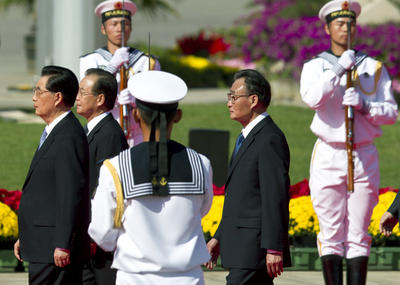Yet some things will change in the coming years. The new leadership is well prepared to deal with the international system and its institutions. An increased sense of confidence derived from China’s growing competence in dealing with the international community will render new opportunities for engagement. But a more complicated international environment will require China to adopt a mature approach if it wishes to employ diplomacy and to use its comprehensive power effectively.
The greatest test the leadership will face in the near term will be how to address China’s disputes with neighbouring states over interests in the South China Sea. China is unlikely to depart from its current policy of reconciliation through bilateral and multilateral interaction, seeking to resolve disputes through international legal institutions via consideration of relevant historical evidence, in the South China Sea and elsewhere. It sees this policy as an opportunity to demonstrate its leadership abilities in settling disputes to the broader international community.
Theoretically China retains the right to resolve these disputes using any and all means at its disposal, but ideally it would prefer to pursue a diplomatic solution. Whether China will be more assertive in its territorial claims under the new administration depends on how it views cost effectiveness and the stakes involved. These perceptions are based on many domestic and international factors.
Internal factors primarily include energy security and access to other mineral and fishery resources. China will face increasingly grim prospects regarding resource security in the short run, and such pressures could affect its external behaviour. The fundamental fix for this problem is to significantly raise China’s resource efficiency — the ultimate goal being to reach Japanese levels. Ideally, China will cut its net energy consumption in the coming years. The next administration’s strategic investment in China’s long-term energy future is crucial.
Externally, on the South China Sea issue, the new leadership needs to present a package deal to China’s ASEAN neighbours, to tackle their respective claims in a truly balanced manner. Such measures might include preventive diplomacy, and the co-management and development of disputed areas, waters and resources.
Another area of challenge and opportunity for China will be in forging rule-based norms of cyber and space security. The new leadership’s policies toward these and other global commons will help determine China’s ability to realise its potential to become a capable and responsible new superpower.
Entering the second decade of the new century, China must be careful that its foreign policy does not become characterised by its disagreements with others, but rather by its ability to propose and build consensus. By demonstrating respectful leadership when working toward regional reconciliation, China will need to assure the international community of its peaceful intentions.
China has sought to enhance its ability to influence other nations through soft power. China must therefore abide by the rules of international engagement to present itself as a responsible stakeholder. This could help dispel concerns over China’s intentions and strategic aims. Beijing can best apply its soft power through promoting its own social and economic development. China could also enhance its capacity to positively affect other nations by stressing its responsibility to protect its own people, and extend such protective assistance overseas through proper international platforms and mandates.
On China–United States relations, any issue can be an opportunity or a challenge. The United States has never left Asia; by ‘rebalancing’ it is simply emphasising its interests by enhancing its presence in and interaction with Asia. While the United States aims to stabilise the region, its actions could potentially either achieve that objective or create greater instability. However, China and the United States share a common interest in regional stability and Beijing will welcome US movement toward its declared aims.
Among various possibilities, increasingly balanced trade might offer the most potential for collaboration between the two. China will soon surpass the United States as the world’s number one importer, and expects to double its imports over the next five years. Over the same time span, the United States aims to double its exports. Both countries’ plans may be mutually beneficial.
More gloomy prospects arise when considering issues pertaining to access to and security of the global commons — for example space, maritime areas and cyberspace. These issues are likely to dominate the disagreements within United States–China strategic interactions, while subjects such as Taiwan are likely to be far less explosive over the next decade.
Shen Dingli is Professor and Executive Dean at the Institute of International Studies and Director at the Center for American Studies, Fudan University.

